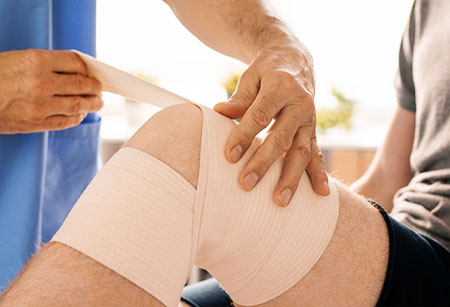Your knee is a large and complex hinge joint, responsible for bearing the weight of your upper body and allowing you to move your lower body with ease.
The anterior cruciate ligament (ACL) connects your femur (thighbone) to your tibia (shinbone). It plays a significant role in stabilising your knee but it is vulnerable to injury, especially during sports.
Many sports involve sudden twisting movements, changes in direction or landing after a leap. Those moves are common across the football codes and in many other sports like basketball, netball or tennis.
Experiencing an ACL injury can be deeply distressing. It’s not only painful and debilitating, but it can also keep you off the pitch for several months.
If you’re considering ACL surgery, you’ve probably got many questions or concerns. That’s quite normal – it’s a big decision, after all, that will affect your future.
Here are some of the questions that I’m commonly asked by patients considering surgery. Hopefully, they’ll help you decide how to proceed and give you realistic expectations.
When is ACL surgery needed?
Non-surgical options for treating ACL tears can work well for many people. However, surgery is often advised if you’re young, active, play sports that put pressure on your ACL through pivoting and have other injuries to your knee such as a meniscus tear.
What’s the goal of ACL surgery?
Clinically speaking, the goal of ACL surgery is to restore your knee joint anatomy and ensure knee stability.
In practical terms, surgery aims to help you get back to your life. Surgery is meant to help you move with confidence again so you’re a force to be reckoned with on the footy pitch once more.
Surgery alone doesn’t get you there (rehabilitation is vital too) but restores a strong foundation so you can move forward in your recovery.
When’s the best time to have my ACL surgery?
When your surgeon advises that the time is right. In making that decision, your surgeon takes into account factors such as:
- When the injury happened
- Your pain levels
- Your knee’s appearance, range of motion and muscle control
- Whether there are other injuries to consider.
Usually, ACL surgery takes place within 1-3 months after the injury occurred, once the initial inflammation has subsided. If we operate too soon, we risk your body responding by building up too much scar tissue. If we delay too long, the surgery may not succeed as well as we’d like.
That means there’s a window of opportunity for ACL surgery. It gives you some chance to recover from the initial injury and plan surgery around your work or family commitments.
What happens in ACL reconstruction surgery?
ACL reconstruction surgery is done under general anaesthetic (you’ll be unconscious) using minimally invasive techniques. We reconstruct your ACL using a graft of replacement tissue. The graft is passed through bone tunnels and fixed down, giving your knee stability again.
You’ll usually go home next day.
Which grafts are available?
The graft can be taken from the:
- Your own hamstring tendon (most common), patella tendon or quadriceps tendon
- A donor (known as an allograft)
- A synthetic graft.
Learn more about graft choices.
What’s involved in recovering from ACL surgery?
You’ll see your surgeon and physiotherapist before you leave hospital and be given advice on pain relief and movement.
You’re likely to be on crutches for up to two weeks and may also be advised to wear a knee brace.
At around 6 weeks after surgery, you’ll start to participate in a rehabilitation program led by a physiotherapist. Your rehab program will involve progressive exercises to increase your knee’s strength and range of motion. As time goes on, you’ll be able to put more pressure on your knee through straight-line exercises like running and then you can begin pivoting.
Learn more about recovering from ACL surgery.
When can I go back to work or sport?
We usually advise you to have 1-2 weeks off work to help you manage swelling and pain.
It may take 2 weeks or longer before you’re able to drive again, depending on how your knee is recovering.
As for returning to sport, it’s important to remember that your body recovers in its own time. So, rather than putting a clock on your recovery, we prefer you to trust the expertise of your surgeon and physiotherapist who will progress you through your rehab program at your own pace and clear you to return to sport when you meet objective criteria. You should expect this to take 9-12 months.
How can we help?
Dr Ross Radic is an experienced orthopaedic surgeon who consults from rooms in West Perth, Palmyra, Mount Claremont and Broome and performs operations at Hollywood Private Hospital, Bethesda Private Hospital and Royal Perth Hospital.
If you’ve experienced an ACL injury and are keen to get back on your feet, please call 08 9212 4292 to find out how we can help you.
Disclaimer
All information is general and is not intended to be a substitute for professional medical advice. Dr Radic can consult with you to confirm if this treatment or procedure is right for you. Any surgical or invasive procedure carries risks. A second opinion may help you decide if a particular treatment is right for you.




